#dan guo
Explore tagged Tumblr posts
Text

The D Team: Agent G-37 (he/him)
Full name: Dan Guo (郭丹)
Alias: Agent G-37, Danny
Gender: Cisgender man (he/him)
Orientation: Polyamorous Bisexual
Age: 32
Nationality: Chinese-American
Religion: Agnostic
Western Zodiac: Aquarius
Eastern Zodiac: Goat
Element: Metal
Birth Stone: Amethyst
Blood-type: B+
Personality Type: INTJ
Disabilities: ADHD, PTSD
Eye color: Brown
Natural Hair Color: Black
Natural Hair Type: 1C
Skin Color: Tan, golden undertones
Height: 5 feet, 10 inches (155 cm)
Weight: 175lbs (79 kg)
Appearance: Tall with lithe muscles and chiseled features, Dan keeps his hair short and tidy though the rest of him is a fashion disaster
Personality: Loyal, adventurous, unpredictable, and resilient
Moral Alignment: Neutral Good
Backstory: Dan is the guy who’s got a guy for just about everything, if you can find him you’re set, but after faking his death to run off and live with his minotaur boyfriend he’s not the easiest man to find
Faceclaim: Manny Jacinto
8 notes
·
View notes
Text
Why Do We Cultivate Knowledge?
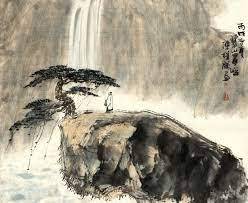
Musing on chapters 14 & 16 of Master Zhuang's Outer Chapters: "The Revolving Heaven天運" & "Mending One's Original Nature or Correcting The Nature 繕性"
[16.1.1] "Once they have mended original nature with conventional wisdom, people now seek to recover its initial state."
This is to mean that when we take in accord with the vulgar "wisdom" of the world and try to use it to alter our innate nature's, we become ever estranged from the Dao.
For most of the Zhuangzi, we see a very anti-epistemological approach. A doing away with the conventional and human distinctions on "what is" and "what isn't," [Zhuangzi 2.14.11-14]. We are told to abandon the pursuit of knowledge [Dao dejing 3]. This is what Master Lao Dan (Laozi) would have Confucius do in chapter 14 天運 "The Revolving of Heaven." Master Zhuang presents us with another dialogue between the illustrious characters where Confucius had been searching high and low for the Dao for 51 years. Yet, he has not yet attained It [14.22]. Lao Dan inquires where Confucius had been seeking The Dao. Confucius says for 5 years he had sought the Dao in astronomical/astrological calculations for 5 years, yet he has still failed to acquire the inarticulate Dao. For 12 years, Confucius sought the Yin and Yang, yet he still has not attained it [14.23-27]. Lao Dan responds wonderfully to Confucius's journey, saying that,
[14.28.1] "Exactly! If the Dao could be presented, who would not present it to his sovereign! If the Dao could be offered, who would not offer it to his parents! If the Dao could be conveyed, who would not convey it to his brothers! If the Dao could be bestowed, who would not bestow it on his sons and grandsons! However, all this is impossible for no other reason than because no master exists within, so it does not linger."
According to Guo Xiang, this means Lao Dan would have Confucius do away entirely with knowledge. Confucius, as he is being presented currently, is looking outward for The Dao, yet he has no master within himself to properly use this knowledge in accord with his natural principle.
Lao Dan says this in 14.28.3-4, "If that which may emerge from within is not received without, the sage does not let it go forth. If that which may enter from without finds no master within, sageness won't abide there." 14.28.3 gives validity to the teacher-student transmission of things. For if no one is there to hear your teaching that arrives spontaneously, in step with Dao and its principles, the teachings do not go forth. And likewise, if we are not present, living radically in the moment while we are (outwardly) learning, true sageness/Dao will not abide within or out of us.
The rest of Confucius and Lao Dan's dialogue concludes that he must do away with those "classics" that I mentioned in my last post. Guo Xiang expands on this, conveying that without us being in accord with our natural principles and finding tranquility from within, everything we learn and know is fodder. It does nothing but estrange us from the speechless Dao. Although the pursuit of knowledge is indeed fulfilling, without us being radically in the moment while we are being presented with "learning" or "knowledge," how can it abide within us and, ergo, fulfill our virtue?
So now we are jumping back to chapter 16. This is quite a curious chapter, meaning it slightly shifts its perspective on knowledge. 16.1.2 tells us, "Having confused their desires with conventional wisdom, they now seek to perfect their understanding through self-conscious thought." This is too mean that we have confused our innate principle with the literal desire to attain knowledge, for knowledge's sake, self-consciously self-reflecting on said knowledge, forever refining our thinking; forever causing us to err. Master Zhuang calls these people the obstructed and obscure [16.1.3]. Guo Xiang expounds on this by suggesting only if we abandon such conventional wisdom and rid ourselves of the desire to attain such wisdom we would be so close to this ineffable Dao.
We must find that "master" within us, as suggested in Chapter 14.28.1, for knowledge to truly benefit us and aid our arsenal to cultivate the Dao. Without it, our nature is lost, and knowledge is thus agitated. This is why in 16.2.1, we are told, "In antiquity those who governed with the Dao cultivated knowledge in tranquility." And again, in 16.2.2, "They knew how to live but were free of knowing how to act with self-conscious purpose, so it may be said of them that they used knowledge to cultivate tranquility." I take this to mean, with the help of Guo Xiang, we just must spontaneously know. Knowledge is something that we must cultivate, there is no question about it. Setting aside religion and philosophy for a second and just using logic, we know that learning and knowledge are fundamental parts of the human experience. We constantly learn daily, whether we are fully aware of it or not. And that, right there, is the point, our awareness of the mass cultivation of knowledge we experience in an ever-globalized world. We are more connected and can access knowledge at the click of a button or a few strokes on a keyboard. Without us being presently aware, living radically in the moment of the knowledge we absorb, the knowledge is agitated, and our natures are obstructed.
Knowledge must nourish our souls and our innate principles. The same is said in reverse, our "master within" or our innate principle must be acted in accordance with the knowledge we receive. This knowledge "used to cultivate tranquility" sounds awfully like gnosis as described in more Western schools of thought, such as Hermeticism. But before we get into that, I must say how important it is to first become tranquil, meaning mastering our inner selves, which could mean becoming more disciplined, doing away with our self-preconceived notions of "this is" and "this is not" and thus, having a complete disregard for knowledge before we embark on any kind of "knowledge" or gnosis. Our tranquility must nourish the knowledge we receive outwardly; likewise, the knowledge we take in must nourish our inner selves.
Okay, enough redundancy. How does this "knowledge used to cultivate tranquility" compare to gnosis? Let's look at Corpus Hermeticum book IV.9: "Thus knowledge is not a beginning of the Good, but it furnishes us the beginning of the Good that will be known... For the Good has neither shape nor outline." Now, Hermeticism is big on "knowledge" or gnosis, which can be defined as the "highest" form of knowledge there is. This knowledge pertains to the Good who is God (The One) and other incorporeal entities such as the gods. It is not something that can be necessarily be "cultivated," in my opinion, but rather experienced. This is not all too different from chapter 16 from Zhuangzi's description of cultivating knowledge to nourish our tranquility and vice-versa [16.2.2]. Gnosis, knowledge, or whatever kind of "learning" is never the beginning of the Good, or of the Dao, but it does indeed furnish us to begin to know the road that leads to the Good, or the Dao.
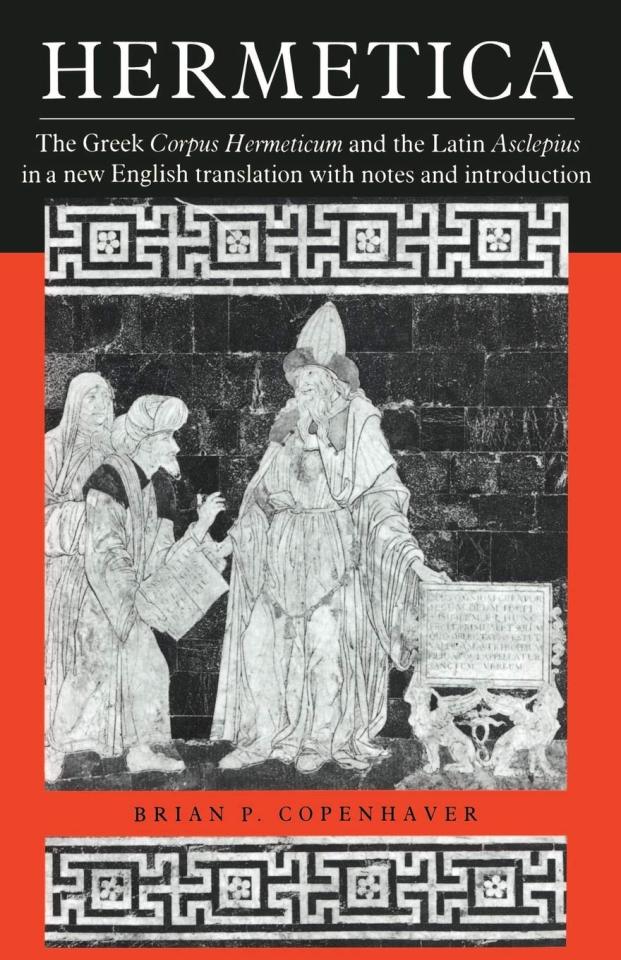
CH IV.11 then tells us, "If your vision of it (The Good) is sharp and you understand it with the eyes of the heart, believe me, child, you shall discover the road that leads above, or rather, the image itself will show you the way. This sentiment rings back in chapter 14 of the Zhuangzi when we discussed finding "the master within" [14.28.3-4]. To "understand it with the eyes of the heart" sounds similar to having a "master exist within."
So to wrap this up, knowledge is okay to cultivate. Knowledge is okay to pursue. Knowledge is something we should strive for. If and only if, we use said knowledge to cultivate our virtue, our tranquility, and our innate principles. We must be in step with our inner selves first and foremost before any pursuit of knowledge or gnosis can have any real, practical effect in our lives. In Hermetic terms, we must use gnosis to furnish our road to The Good which belongs only to the Godhead. Any other knowledge that employs the use of logos, or speech (the conventional wisdom as mentioned above in Zhuangzi 16.1.1), will be fodder in comparison to the gnosis that is experienced and used to furnish our road and the ineffable Good, that is God.
**DISCLAIMER** Any philosophical parallels I draw between Eastern and Western schools of thought are for my own understanding. These parallels, as vague as they might seem, are not to suggest that there is any metaphysical or historical connection or of any historical transmission of ideas between said Eastern (Daoism) and Western schools (Hermeticism). I draw these parallels to remind myself that ideas and philosophical concepts can have similar sentiments, even though the cultivation of each thing (the Dao, and the Good) are gone about in different ways, practice-wise.
#philosophy#daoism#taoism#lao tzu#lao dan#zhuangzi#guo xiang#dao#dao dejing#laozi#corpus hermeticum#hermeticism#hermetic philosophy#hermetica#chinese philosophy
10 notes
·
View notes
Text










Cdrama: Fox Spirit Matchmaker: Red-Moon Pact (2024)
Gifs of Intro of cdrama "Fox Spirit Matchmaker: Red-Moon Pact"
【Multi Sub | FULL】 EP01 The Fox picks up a child | Fox Spirit Matchmaker: Red-Moon Pact 狐妖小红娘月红篇 iQIYI
Watch this video on Youtube: https://www.youtube.com/shorts/4YEjj6Kkgew

#Fox Spirit Matchmaker: Red-Moon Pact#涂山小红娘月红篇#Fox Spirit Matchmaker 1#Fox Spirit Matchmaker: Yue Hong#Tu Shan Xiao Hong Niang Yue Hong Pian#Tu Shan Xiao Hong Niang#Hu Yao Xiao Hong Niang#狐妖小红娘•月红篇#狐妖小红娘#狐妖小紅娘月紅篇#2024#episode 1#1st episode#CCTV#iQiyi#youtube#cdrama#chinese drama#Yang Mi#Gong Jun#Cristy Guo#Wei Zhe Ming#Hu Lian Xin#Wen Zheng Rong#Zhu Xu Dan#Yang Shi Ze
0 notes
Text







I keep Shen Xing around for Dan Tuo.
Jiang Qilin as Dan Tuo & Guo Qilin as Shen Xing in 边水往事 | Escape from the Trilateral Slopes (2024) episode 6+7
#escape from the trilateral slopes#cdramaedit#cdramasource#asiandramanet#cdrama#chinese drama#边水往事#dramasource#dailyasiandramas#asiancentral#jiang qilin#guo qilin#userkunedits#mlmsource#cinemapix#crimeshowsource#filmtvtoday#filmtvcentral#userthing#tvedit#dailyflicks#fyeahtv#tvarchive#cinematv#userbbelcher#chewieblog#mancandykings#flawlessgentlemen#usersource#usertelevision
46 notes
·
View notes
Text
wait.. i’m literally on here or weibo almost 24/7 ( as you can tell lol ) but I feel like i missed something. i’m seeing clowning related to xz’s photos and how it looks like he is a groom and it’s a wedding photoshoot. the place is also famous for wedding shoots ( allegedly, idk. i’m not from there ) so turtles are imagining again. lol. freakin coincidence that wyb’s GRA photoshoot was done at a wedding shop. plus the “wedding outfits” for weibo night. which is all clowning and galaxy braining.🌌

now, we’re joking around, like where’s yibo? he should be taking photos with his partner.
then i see comments that there is this one song WYB recently listened to. meaning, as recent as when XZ flew to singapore which is called 超人不会飞 (superman can’t fly) by Jay Chou. i know WYB and everyone else is a big fan of Jay Chou but the clowning comes from the timing of when he listened to it. let me get to that first.
here is the song if you wanna listen to it. 🎶
youtube
turtles are interpreting it as WYB longing to “fly” to where XZ is and be with him but he can’t because of all his work commitments. he wants to take a breather. thinking about what his life is and the constraints, and at times like this, when they spent days in Beijing, but now they have to be apart, it affects him even more.
however when i read the lyrics, it could also be because he can relate to what jay chou is singing about. here’s the english translation i found here. i have bolded the ones i felt like WYB relates too. literally no need for explanation. just read it. It fits with his status in life so much that it’s almost scary.
妈妈说很多事别太计较
ma ma shuo heng duo shi bie tai ji jiao
Mum said one should not be too fussy over most matters
只是使命感找到了我 我睡不着
zhi shi shi ming gan zhao dao le wo wo shui bu zhao
But my sense of mission found me and i can't sleep over it
如果说骂人要有点技巧
ru guo shuo ma ren yao you diao ji qiao
If scolding someone requires some skills
我会加点旋律你会觉得 超屌
wo hui jia diao xuan lu ni hui jue de chao diao
I will add a tune and you will feel it's very cool (diao)
我的枪不会装弹药(弹药)
wo de qiang bu hui zhuang dan yao (dan yao)
My gun is not loaded with ammunition
所以放心不会有人倒(人倒)
suo yi fang xin bu hui you ren dao (ren dao)
So don't worry, nobody will collapse
我拍青蜂侠不需要替身 因为自信是我绘画的颜料
wo pai qing feng xia bu xu yao ti sheng yin wei zi xin shi wo hui hua de yan liao
I don't need a double for The Green Hornet because confidence is the coloring for my painting
我做很多事背后的意义远比你们想象
wo zuo heng duo shi bei hou de yi yi yuan bi ni men xiang xiang
The meaning behind the things I did is far beyond your imagination
拍个电视剧为了友情与十年前的梦想
pai le dian shi ju wei le you qing yu shi nian qian de meng xiang
Filming a tv drama is for friendship and a dream 10 years ago
收视率再高也难抗衡我的伟大理想
shou shi lv zai gao ye nan kang heng wo de wei da li xiang
No matter how high the rating is, it can't match my noble ideal
因为我的人生无需再多一笔那奖项
yin wei wo de ren sheng wo xu zai duo yi bi na jiang xiang
Because my life do not need another award
我不知道何时变成了社会的那榜样
wo bu zhi dao he shi bian cheng le se hui de na bang yang
I don't know when I have become a society's role model
被狗仔拍不能比中指要大器的模样(怎样)
bei gou zai pai bu neng bi zhong zhi yao da qi de mo yang (zen yang)
Can't show the paparazzi the finger and have to put on a magnanimous front
我唱的歌词要有点文化
wo chang de ge ci yao you dian wen hua
The lyrics I sing must have some degree of literacy
因为随时会被当教材
yin wei sui shi hui bei dan jiao cai
Because it might become teaching material anytime
CNN能不能等英文好一点再访
CNN neng bu neng deng ying wen hao yi dian zai fang
Can CNN interview me when my English gets a little better
时代杂志封面能不能重拍
shi dai za zhi feng mian neng bu neng chong pai
Can i reshoot the Time magazine cover
随时随地注意形象
sui shi sui di zhu yi xin xiang
I must take care of my image at all times
要控制饮食不然就跟杜莎夫人蜡像的我不像(本来就不像)
yao kong zhi yin shi bu ran jiu gen du sha fu ren la xiang de wo bu xiang (ben lai jiu bu xiang)
I must control my diet or i won't look like the "me" in Madame Tussauds (it doesn't look like me in the first place)
好莱坞的中国戏院地上有很多手印脚印
hao lai wu de zhong guo xi yuan di shang you heng duo shou yin jiao yin
There are many handprints and footprints at Grauman's Chinese Theatre
何时才能看见我的掌
he shi cai neng kan jian wo de zhang
When will mine be seen there?
如果超人会飞 那就让我在空中停一停歇
ru guo chao ren hui fei na jiu rang wo zai kong zhong ti yi ti xie
If Superman can fly then let me take a breather in the sky
再次俯瞰这个世界 会让我觉得好一些
zai ci fu kan zhe ge shi jie hui ran wo jue de hao yi xie
Overlooking this world again will let me feel better
拯救地球好累 虽然有些疲惫但我还是会
zheng jiu di qiu hao lei sui ran you xie pi bei dan wo hai shi hui
Saving the world is tiring, though I am a little tired, I still will
不要问我哭过了没
bu yao wen wo ku guo le mei
Don't ask me if I have cried
因为超人不能流眼泪
yin wei chao ren bu neng liu yan lei
Because Superman can't cry
唱歌要拿最佳��歌手
chang ge yao na zui jia nan ge shou
(You) must get best male singer award as a singer
拍电影也不能只拿个最佳新人
pai dian yin ye bu neng zhi na ge zui jia xin ren
A newcomer award is not enough if you act
你不参加颁奖典礼就是没礼貌
ni bu can jia ban jiang dian li jiu shi mei li mao
Not attending award ceremonies is considered rude
你去参加就是代表你很在乎
ni qu can jia jiu shi dai biao ni heng zai hu
And if you do, it means you are over-concerned about it
得奖时你感动落泪(落泪)人家就会觉得你夸张做作(做作)
de jia shi ni gan dong luo lei (luo lei) ren jia jiu hui jue de ni kuang zhang zuo zuo
When you won an award and teared, people will think you are fake and exaggerating
你没表情别人就会说太嚣张
ni mei biao qing bie ren jiu hui shuo tai xiao zhang
When you have no expression, others will say you are too arrogant
如果你天生这个表情 那些人甚至会怪你妈妈(妈妈)
ru guo ni tian sheng zhe ge biao qing na xie ren sheng zhi hui guai ni ma ma (ma ma)
And if you are born with that expression, they will even blame your mum
结果最后是别人在得奖 你也要给予充分的掌声与微笑
jie guo zui hou shi bie ren zai de jiang ni ye yao ge yu chong fen de zhang sheng yu wei xiao
In the end someone else gets the award, you also have to give ample applause and smile
开的车不能太好 住的楼不能太高
kai de che bu neng tai hao zhu de lou bu neng tai gao
The car you drive can't be too luxurious nor can you live too high up
我到底是一个创作歌手 还是好人好事代表
wo dao di shi yi ge chuang zuo ge shou hai shi hao ren hao shi dai biao
Am I a singer-songwriter or a representative of good men and good deeds?
专辑一出就必须是冠军
zhuan ji yi chu jiu bi xu shi guan jun
My album must be ranked top once released
拍了电影就必须要大卖
pai le dian yin jiu bi xu yao da mai
My movie must sell well
只能说当超人真的好难
zhi neng shuo dan chao ren zhen de hao nan
I can only say, being a Superman is difficult
如果超人会飞(超人会飞)那就让我在空中停一停歇(停一停歇)
ru guo chao ren hui fei (chao ren hui fei) na jiu rang wo zai kong zhong ti yi ti xie (ti yi ti xie)
If Superman can fly then let me take a breather in the sky
再次俯瞰这个世界 会让我觉得好一些
zai ci fu kan zhe ge shi jie hui ran wo jue de hao yi xie
Overlooking this world again will let me feel better
拯救地球好累(地球好累)虽然有些疲惫但我还是会(我还是会)
zheng jiu di qiu hao lei (di qiu hao lei) sui ran you xie pi bei dan wo hai shi hui (wo hai shi hui)
Saving the world is tiring, though I am a little tired, I still will
不要问我哭过了没
bu yao wen wo ku guo le mei
Don't ask me if I have cried
因为超人不能流眼泪
yin wei chao ren bu neng liu yan lei
Because Superman can't cry
=====
I don’t think there is anything wrong with how cpfs are relating this to cpn cause that’s just how it is. But sometimes, there are other reasons why they do what they do.
SO MY CONFUSION COMES FROM HOW THE HELL DO PEOPLE KNOW WHAT HE RECENTLY LISTENED TO. I can’t seem to dig up how or maybe it’s something we don’t talk about. I have never experienced this kind of tidbit related to them before so I wanna know the source. Or is this like the gaming cpn where certain people know and they will not divulge the boy’s account for privacy? if anyone knows, feel free to comment. If i find out in the future, I will share.
87 notes
·
View notes
Text
Apr 11, Xi'an, China, Beilin Museum (Stele Forest):
Continuing from the previous post about the museum... I have a LOT of pictures from this trip to Xi'an, almost 900 pictures total. For the sake of brevity, I will not post all of them.
Jingyun Bell/景云钟:
The Jingyun bell is a giant bronze bell cast in 711 AD (Tang dynasty), this bell was originally inside the Bell Tower of Xi'an/西安钟楼, and bear the inscription written by Emperor Ruizong of Tang/唐睿宗 (full name Li Dan/李旦). This bell is 2.47 m tall (~8.1 ft), has a circumference of 4.86 m (~15.9 ft), has a diameter (at opening) of 1.65 m (~5.4 ft), and weighs 6 metric tons (~6.6 US tons).
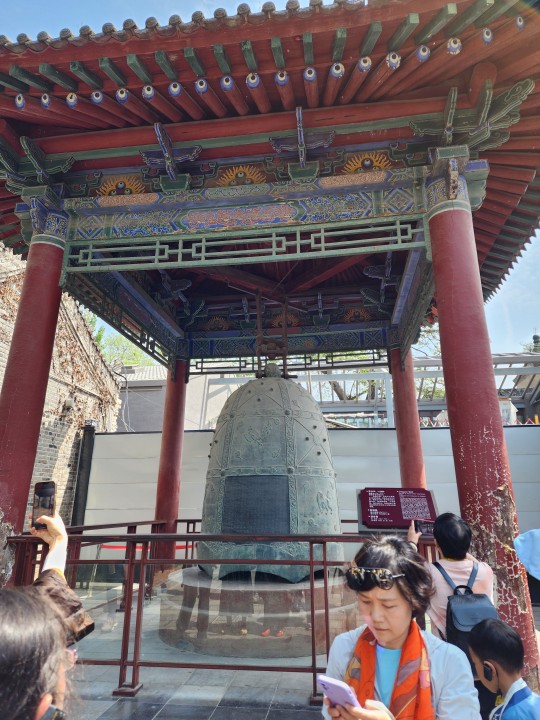
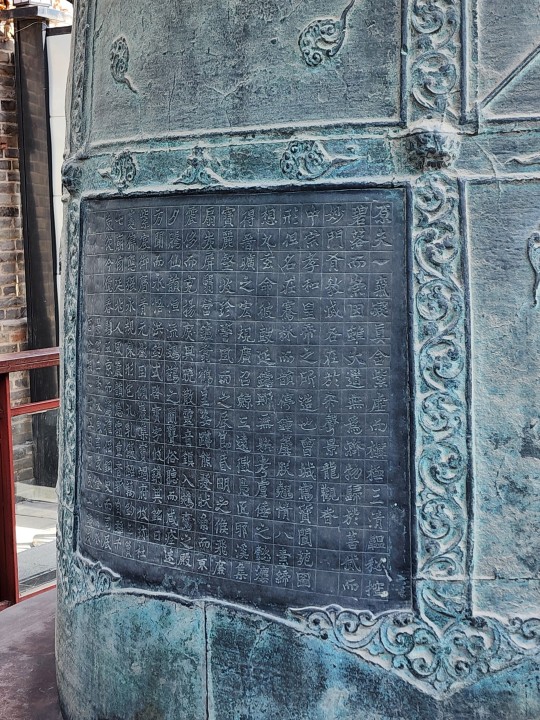
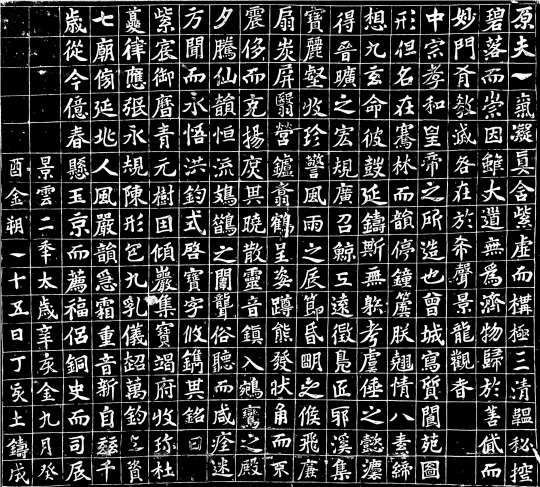
Fun fact about Emperor Ruizong of Tang Li Dan: apparently he has the nickname of "六位帝皇丸", or "Six Emperors Wan". "六味地黄丸" is the name of a prescription in traditional Chinese medicine, but here it's used as a pun. This is because Li Dan himself had been emperor twice, his father Li Zhi/李治 was the emperor (Emperor Gaozong of Tang/唐高宗) before him , his mother Wu Zetian/武则天 made him cede the throne to her and became emperor after his first reign (Emperor Zetian Dasheng/则天大圣皇帝), his older brother Li Xian/李显 was an emperor (Emperor Zhongzong of Tang/唐中宗), and finally after his second reign, he ceded the throne to his son Li Longji/李隆基 (Emperor Xuanzong of Tang/唐玄宗). So that's the 6 emperors, and they all came from himself and his immediate family.
Just in case that was confusing, here's his family tree:
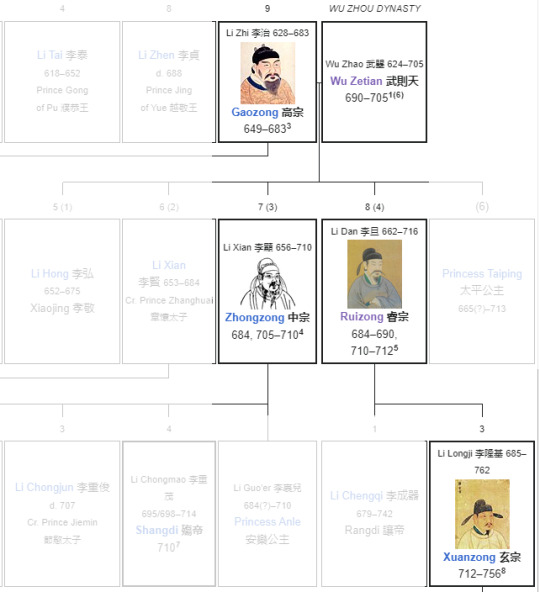
One more fun fact about the bell itself: it provided the bell sound sample heard at midnight in CCTV New Year's Gala every year. The bell itself probably won't be sounded anymore for conservation purposes--it is over 1300 years old at this point. The bell currently inside the Bell Tower of Xi'an is a replica.
Classic of Filial Piety Set Upon Stone/石台孝经:
This stele is also among the most famous in the Beilin Museum, as it combines the calligraphy work of two emperors of Tang dynasty, Emperor Xuanzong of Tang/唐玄宗 Li Longji/李隆基, and his son, Emperor Suzong of Tang/唐肃宗 Li Heng/李亨, and also has excellent examples of 4 different scripts. Specifically, Li Longji wrote the Classic of Filial Piety/孝经 (a Confucian classic text) and annotated it in lishu/clerical script/隶书, then added comments in xingshu/semi-cursive script/行书. Li Heng wrote the title in zhuanshu/seal script/篆书 (see picture of the actual stele below), and a memorial written in kaishu/regular script/楷书 by Imperial College Chief/国子监祭酒 Li Qigu/李齐古.
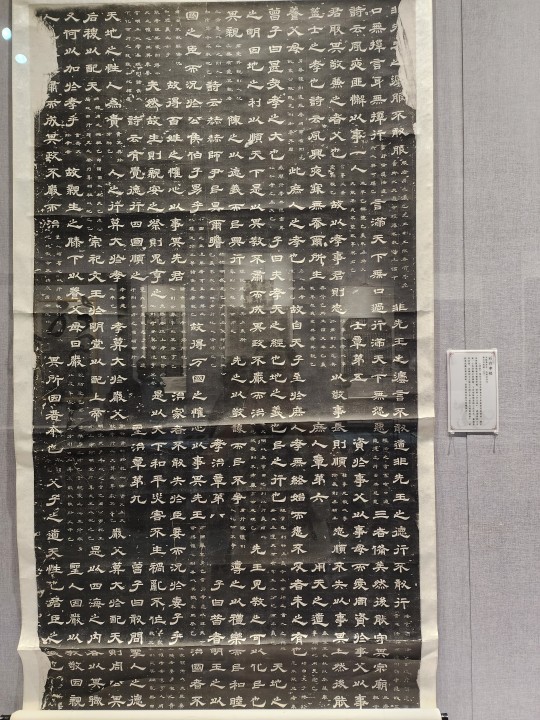
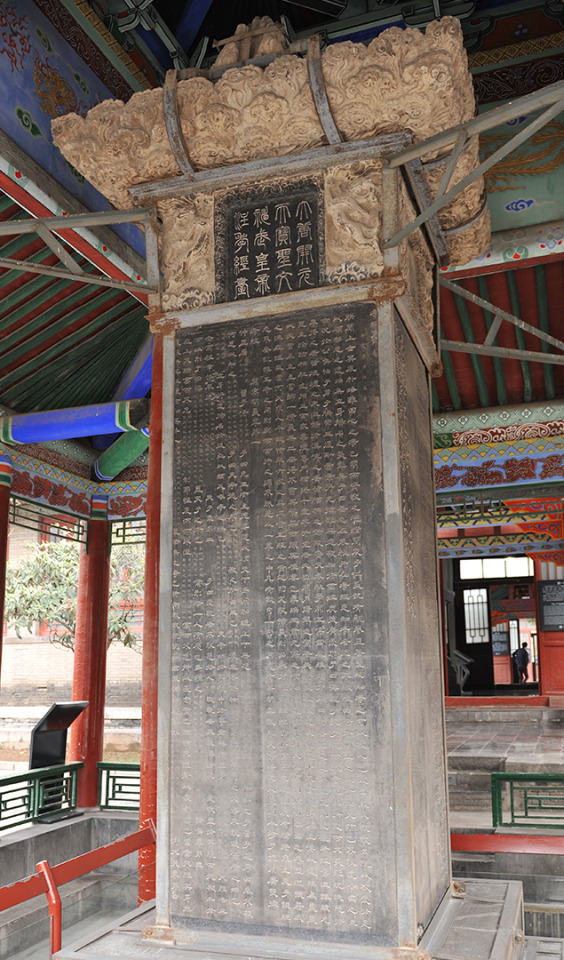
Since the stele actually has inscriptions on all four sides, here's the complete rubbing:
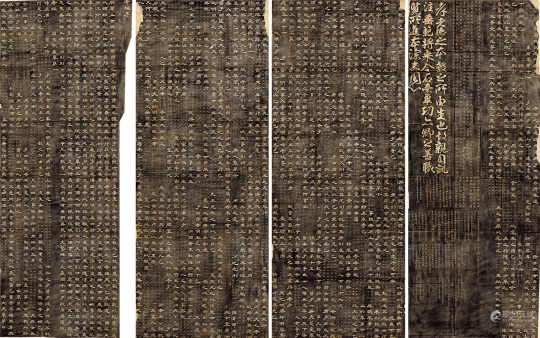
Here's the pavilion over the stele, picture from Wikipedia. The bian'e/匾额 (can be understood as a sign) says "stele forest"/碑林 (read from right to left), and was by Lin Zexu/林则徐 (1785 - 1850). The exact reason why 碑 is missing a stroke at the top is unclear, but one thing is certain: that was one of the correct ways to write the character. It's just that modern standardized systems of written Chinese (both Simplified and Traditional) only accept 碑 as the correct form.
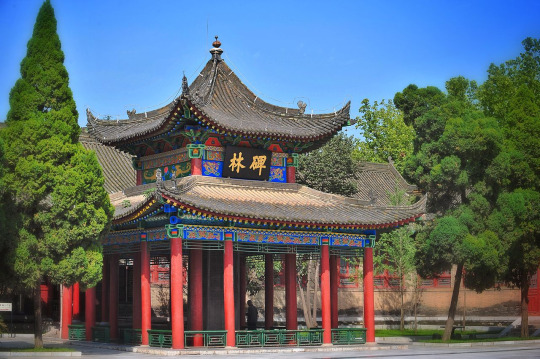
Cao Quan Stele/曹全碑:
One of the most famous steles in the museum. This stele, which praised Cao Quan's accomplishments, was written by Wang Chang/王敞 and was erected in 185 AD (late Eastern Han dynasty). It is important for two reasons, first is because it represents lishu/clerical script/隶书 at its full maturity by the end of Eastern Han dynasty. The second reason is because it provides a great source for scholars studying the history of that time, particularly with regard to the Yellow Turban Rebellion.
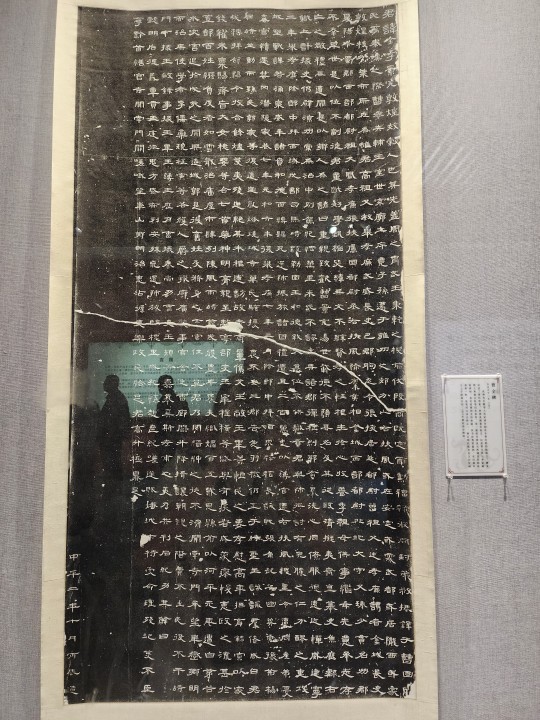
A closeup at the calligraphy:
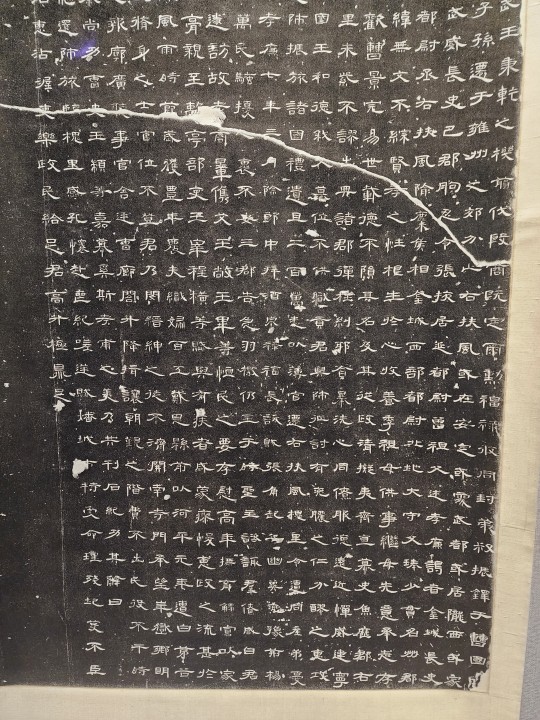
Li Mountain Hot Springs Poem/骊山温泉诗:
This one isn't particularly famous, but it is one of my personal favorites from the exhibition. The calligraphy was by Prince Guo/果亲王 of Qing dynasty (full name Aisin Gioro Yunli/爱新觉罗·允礼) in 1735, and is in the xingshu/semi-cursive/行书 script.
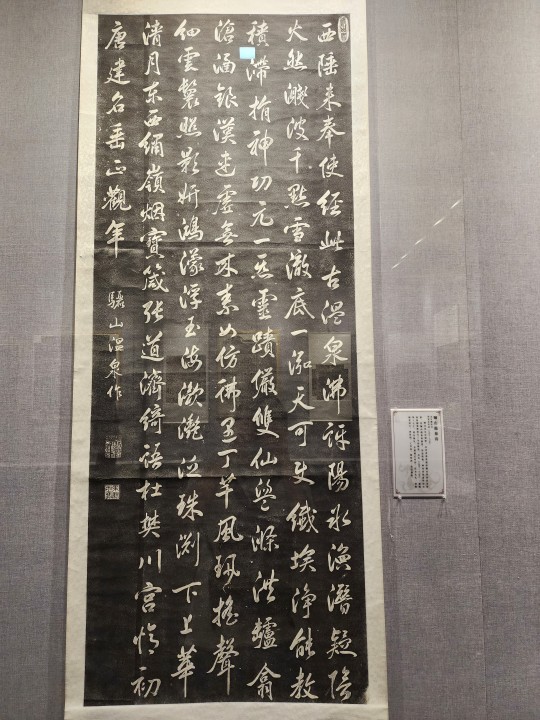
Emperor's Calligraphy Work in Daguan Period/大观圣作之碑:
This stele is actually not part of the Beilin Museum's collection, since it's currently located in Zhaozhou, Hebei, China. I thought I should include it here, because the writing is in a script that I've never really talked about before, which is the shoujinti/"slim gold script"/瘦金体. It's a variation of kaishu/regular script/楷书 that's invented by Emperor Huizong of Song/宋徽宗 Zhao Ji/赵佶, who is the calligrapher here, hence the title.
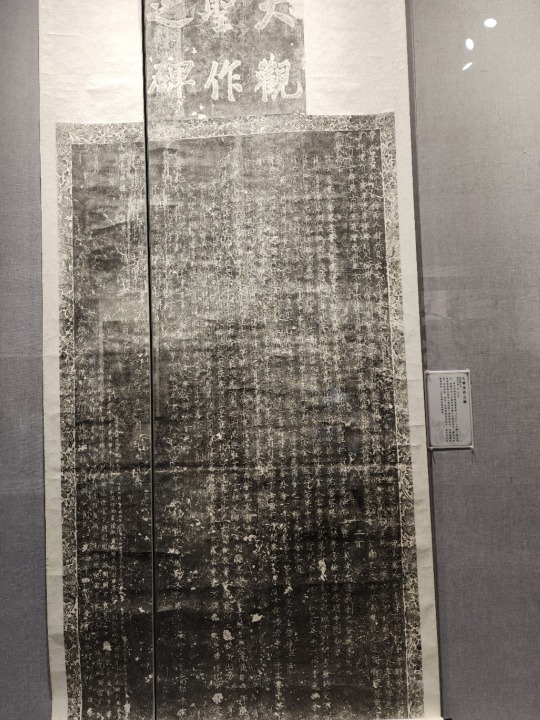
A closeup of the calligraphy:
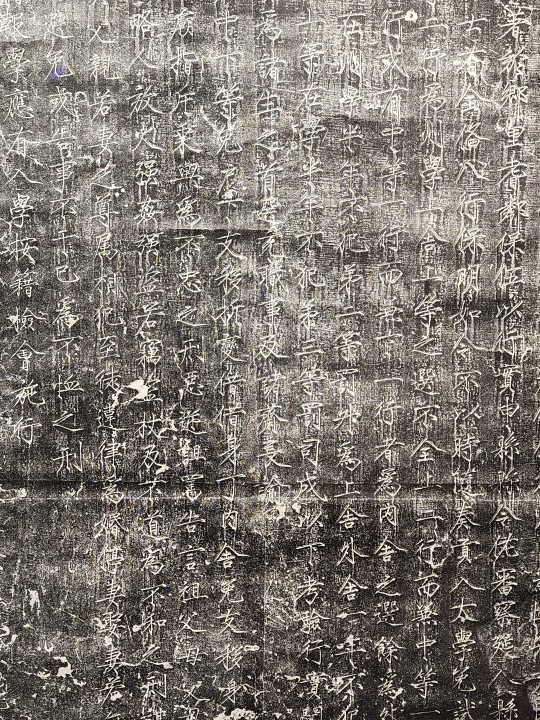
Stele of an Imperial Edict/加圣号诏碑:
By Zhao Shiyan/赵世延 in 1313 (Yuan dynasty). The content is an imperial edict in 1307 that posthumously bestowed the title of "Great Completer, Ultimate Sage and Exalted King of Culture"/大成至圣文宣王 upon Confucius. The purpose of this picture is just to show what the bigger steles really look like, as ink rubbings definitely don't do them justice. The top is decorated with two carved dragons, and the stele is mounted on a stone bixi/赑屃, one of the 9 sons of the loong that has remarkable strength and looks like a turtle (with teeth).
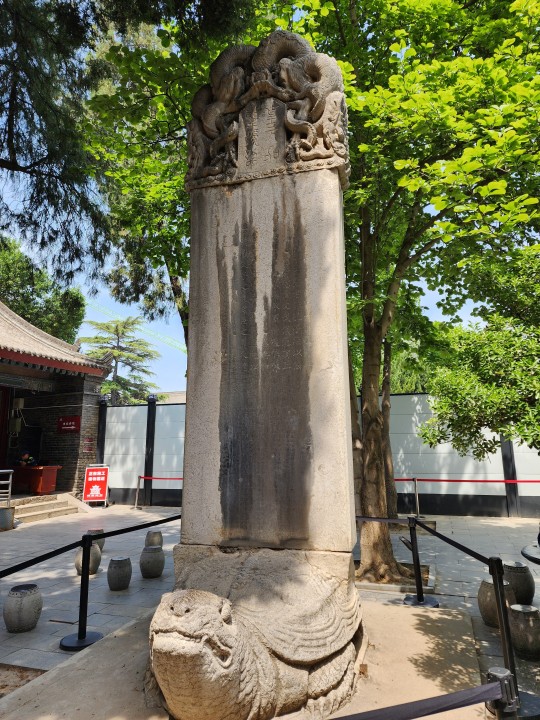
And finally a pagoda tree/槐树 outside the museum that is 1100 years old (planted at around the end of Tang dynasty):
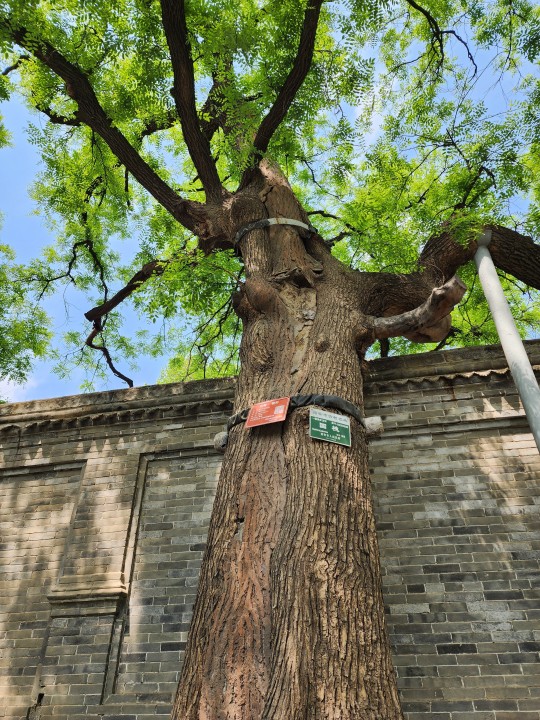
#2024 china#china#xi'an#beilin museum#stele forest#chinese culture#chinese history#chinese calligraphy#calligraphy#chinese art#edited since I screwed up the date of the pictures....I went to beilin museum on the 11th not the 10th :P my bad
25 notes
·
View notes
Text
classic list of Disney originals in chronological order starting in the 40s/50s ending 2023
Snow White & Little Briar Rose & The Frog Prince & Rapunzel by Brothers Grimm
The Adventures of Pinocchio by Carlo Collodi
The Sorcerer’s Apprentice by Johann Wolfgang von Goethe Dumbo the Flying Elephant by Helen Aberson & Harold Pearl Bambi, a Life in the Woods by Felix Salten Casey at the Bat by Ernest Thayer
Peter & the Wolf by Sergei Prokofiev Little Bear Bongo by Sinclair Lewis
Jack and the Beanstalk by Benjamin Tabart Johnny Appleseed, Little Toot by Hardie Gramatky Trees by Joyce Kilmer & Pecos Bill
The Wind in the Willows by Kenneth Grahame The Legend of Sleepy Hollow by Washington Irving
Cinderella & Sleeping Beauty by Charles Perrault
Alice’s Adventures in Wonderland & Through the Looking-Glass by Lewis Carroll
Peter Pan by J.M. Barrie Joe Grant’s Pet English Springer Spaniel Lady, Happy Dan, The Cynical Dog, Lady & the Tramp: The Story of Two Dogs by Ward Greene
The Sleeping Beauty by Pyotr Ilyich Tchaikovsky The 101 Dalmatians by Dodie Smith
The Sword in the Stone by T.H. White
The Jungle Book by Rudyard Kipling
The Secret Origin of the Aristocats by Tom McGowan & Tom Rowe The Legend of Robinhood **
Winnie the Pooh book series by A.A. Milne
The Rescuers book series by Margery Sharp The Fox and the Hound by Daniel P. Mannix
The Chronicles of Prydain by Lloyd Alexander
Basil of Baker Street series by Eve Titus
Oliver Twist by Charles Dickens
The Little Mermaid & The Steadfast Tin Soldier & The Snow Queen by Hans Christian Andersen
Beauty and the Beast by Jeanne-Marie Leprince de Beaumont
Aladdin and the Magic Lamp from 1001 Nights Hamlet by William Shakespeare
The Lives of Pocahontas and John Smith **
Notre Dame de Paris by Victor Hugo
The Greek myth of Heracles **
Ballad of Mulan by Guo Maoqian
Tarzan of the Apes by Edgar Rice Burroughs Noah’s Ark inter Alia Kingdom of the Sun by Roger Allers & Matthew Jacobs
Inca mythology **
The Legend of Atlantis ** Treasure Island by Robert Louis Stevenson Inuit cultures ** Sweating Bullets by Mike Gabriel
Henny Penny **
A Day with Wilbur Robinson by William Joyce •
American Dog by Chris Sanders
The Frog Princess by E.D. Baker
Scandinavian & Sámi cultures **
Big Hero 6 by Man of Action
Buddy cop films ** Polynesian cultures & Hawaiian mythof Māui** Southeast Asian cultures & mythology ** Colombian culture **
Saludos Amigos
The Three Caballeros Make Mine Music Melody Time
The Adventures of Ichabod & Mr. Toad
The Black Cauldron
The Great Mouse Detective
Fantasia & Fantasia 2000
Atlantis : The Lost Empire
Treasure Planet
Brother Bear
Home on the Range Meet the Robinsons
Bolt
Zootopia
Moana
Raya and the Last Dragon
Encanto
Strange World Nov. 23 2022
Wish Nov. 22, 2023
3 notes
·
View notes
Text
Wang Chuan Feng Hua Lu (忘川风华录) Masterpost

Wang Chuan Feng Hua Lu (忘川风华录) is a Vocal synth (Vocaloid and SynthV) music project. It consists of songs themed around different figures throughout Chinese history. The project is a collaboration between different artists and creatives, with music and videos featuring prominent traditional Chinese elements. The project's title translates to "The Records of Magnificence of the Wangchuan" - In Chinese mythology, "Wangchuan" (or River of Forgetting) is a river in the Underworld that can rid one of their past life's memories, similar to the river Lethe.
A mobile game adaptation has also been developed by NetEast. Unfortunately, I haven't played it so I can't give much insight on it. However, I assume that its premise is similar to that of the idea behind the project as a whole: all these historical figures meeting each other in the Underworld after they died. Maybe.
You can find all the songs on Bilibili. The official Weibo can be found here. The game's website, which includes all characters appearing so far in the game, can be found here, and its Weibo can be found here.
(If you prefer YouTube, I've also put together a handy playlist. Please know that most of these videos are reposts though, so please watch the original Bilibili MVs if you can!)
This blog is where I will be posting everything I feel like I need to say about the songs in this project. A lot of it is lifted from my Twitter account but will be in much more detail. Note that I probably won't touch collab songs, or songs that don't focus solely on the project's own characters.
Disclaimer: I do not speak Chinese, nor am I an expert on Chinese history. Therefore, I cannot reliably translate the lyrics to these songs, nor my words should be taken as gospel. I am merely a nerd gushing about my hyperfixation.
Playlist
多情岸 【Duo Qing An】 ➼ B link
洛阳怀 【Luo Yang Huai】 ➼ B link
易水诀 【Yi Shui Jue】 ➼ B link
山河令 【Shan He Ling】 ➼ B link
簪花人间 【Zhan Hua Ren Jian】 ➼ B link
栖凰 【Qi Huang】 ➼ B link
心上秋 【Xin Shang Qiu】 ➼ B link
祖龙吟 【Zu Long Yin】 ➼ B link
如见青山 【Ru Jian Qing Shan】 ➼ B link
竹林间 【Zhu Lin Jian】 ➼ B link
天下局 【Tian Xia Ju】 ➼ B link
青鸟衔风 【Qing Niao Xian Feng】 ➼ B link
木兰行 【Mu Lan Xing】 ➼ B link
好字唯之 【Hao Zi Wei Zhi】 ➼ B link
不可道 【Bu Ke Dao】 ➼ B link
水叙湖风 【Shui Xu Hu Feng】 (collab) ➼ B link
是非 【Shi Fei】 ➼ B link
风起甘露 【Feng Qi Gan Lu】 (collab) ➼ B link
谓剑 【Wei Jian】 ➼ B link
万象霜天 【Wan Xiang Shuang Tian】 (New Year event song) ➼ B link
千秋梦 【Qian Qiu Meng】 ➼ B link
易安难安 【Yi An Nan An】 ➼ B link
惊鹊 【Jing Que】 ➼ B link
高歌破阵 【Gao Ge Po Zhen】 (collab) ➼ B link
不赴 【Bu Fu】 ➼ B link
西行 【Xi Xing】 ➼ B link
大航海家 【Da Hang Hai Jia】 ➼ B link
牡丹乱 【Mu Dan Luan】 (collab) ➼ B link
倾国 【Qing Guo】 (collab) ➼ B link
相虎 【Xiang Hu】 ➼ B link
补天裂 【Bu Tian Lie】 ➼ B link
此期盈期 【Ci Qi Ying Qi】 (1st anniversary song) ➼ B link
破云来 【Po Yun Lai】 ➼ B link
归钓吟 【Gui Diao Yin】 ➼ B link
始见千秋 【Shi Jian Qian Qiu】 ➼ B link
临川浮梦 【Lin Chuan Fu Meng】 ➼ B link
将军行 【Jiang Jun Xing】 ➼ B link
妄语人间 【Wang Yu Ren Jian】 ➼ B link
数风流 【Shu Feng Liu】 (2nd anniversary song) ➼ B link
问剑春秋 【Wen Jian Chun Qiu】 ➼ B link
起战令 【Qi Zhan Ling】 ➼ B link
人间应又雪 【Ren Jian Ying You Xue】 ➼ B link
旷古回响 【Kuang Gu Hui Xiang】 ➼ B link
墨隐侠声 【Mo Yin Xia Sheng】 ➼ B link
桃源故人 【Tao Yuan Gu Ren】 (3rd anniversary song) ➼ B link
燕双归 【Yan Shuang Gui】 ➼ B link
拜云台 【Bai Yun Tai】 ➼ B link
思华年 【Si Hua Nian】 ➼ B link
承天 【Cheng Tian】 ➼ B link
*Note: The anniversary songs are probably for the game's anniversaries, as the project itself is more than 5 years old.
Albums
Vol 1: 溯洄 【Su Hui】 Includes character songs from Duo Qing An to Zhu Lin Jian. Features human vocals.
Vol 2: 踏浪 【Ta Lang】 Includes character songs from Tian Xia Ju to Yi An Nan An + Shui Xu Hu Feng.
Vol 3: 数风流 【Shu Feng Liu】 Includes character songs from Bu Fu to Yan Shuang Gui, and the two anniversary songs.
Visual character guide:
PRE-QIN | QIN | WESTERN CHU | HAN | THREE KINGDOMS | JIN | NORTH & SOUTHERN DYNASTIES | TANG | FIVE DYNASTIES & TEN KINGDOMS | SONG | YUAN | MING | QING | DREAM
#忘川风华录#wang chuan feng hua lu#wcfhl#chinese music#vocasynth#vocaloid#synthv#vocaloid project#synth v project#synthesizer v#vocal synths#long post#this is the culmination of a 3 year brainrot#i will try my best
15 notes
·
View notes
Text
Ba Baa Baas Bae Baes Bais Bam Ban Bao Baos Bau Baus Be Bees Bei Beis Bem Ben Beo Beos Beu Beus Bi Bias Bie Bies Bii Biis Bim Bin Bio Bios Biu Bius Bo Boes Bom Bon Boo Boos Bou Bous Bu Bua Bues Bui Buis Bum Bun Buo Buu Buus Chi Chia Chias Chie Chies Chii Chiis Chim Chin Chio Chios Chiu Chius Chu Chua Chuas Chue Chues Chui Chuis Chum Chun Chuo Chuos Chuu Chuus Da Daas Dae Daes Dais Dam Dan Dao Daos Daus De Dea Deas Dee Dei Deis Dem Den Deo Deu Deus Dha Dhaa Dhaas Dhaes Dhai Dhais Dham Dhan Dhaus Dhe Dhea Dheas Dhee Dhees Dheis Dhem Dhen Dheo Dheu Dhi Dhia Dhies Dhiis Dhim Dhin Dhio Dhios Dhiu Dhius Dho Dhoa Dhoas Dhoes Dhois Dhom Dhon Dhoo Dhoos Dhou Dhous Dhu Dhua Dhue Dhues Dhum Dhun Dhuo Dhuu Dhuus Di Die Dies Dii Diis Dim Din Dio Diu Dius Do Doa Doas Doi Dom Don Doo Doos Dous Du Duas Due Dues Dui Duis Dum Dun Duu Fa Faa Faas Fae Faes Fai Fais Fam Fan Fao Faos Fau Faus Fe Fea Feas Fee Fees Fei Feis Fem Fen Feo Feus Fi Fia Fias Fiis Fim Fin Fios Fius Fo Foa Foe Foi Fois Fom Fon Foos Fous Fu Fua Fuas Fue Fues Fui Fuis Fum Fun Fuos Fuus Ga Gaa Gaas Gae Gaes Gam Gan Gaos Gau Ge Gea Geas Gee Gei Geis Gem Gen Geo Geu Geus Gi Gia Gias Gie Gies Gii Giis Gim Gin Gios Giu Gius Go Goe Gom Gon Goo Goos Gous Gu Guas Gue Gui Guis Gum Gun Guo Guos Guu Guus Ha Haa Haas Hae Haes Hai Hais Ham Han Haos Hau He Hea Heas Hee Hees Hei Heis Hem Hen Heo Heu Heus Hi Hie Hies Hii Hiis Him Hin Hio Hios Hius Ho Hoe Hom Hon Hous Hu Huas Hui Huis Hum Hun Huo Huu Huus
Ja Jaa Jae Jaes Jai Jais Jam Jan Jaos Jau Jaus Je Jea Jeas Jee Jem Jen Jeo Jeos Jeu Jeus Ji Jia Jias Jie Jies Jii Jiis Jim Jin Jio Jios Jiu Jo Joa Joas Joe Joes Jois Jom Jon Joos Jou Jous Ju Jua Juas Jue Juis Jum Jun Juo Juos Juu Juus Ka Kaas Kae Kai Kais Kam Kan Kao Kaos Kau Kaus Ke Kea Keas Kee Kei Keis Kem Ken Keo Keos Keu Keus Ki Kia Kie Kies Kim Kin Kio Kios Kiu Kius Ko Koe Koes Koi Kois Kom Kon Koo Koos Kou Kous Ku Kua Kue Kues Kum Kun Kuos Kuu Kuus La Laa Laas Laes Lais Lam Lan Laos Lau Laus Le Lea Leas Lee Lees Lei Lem Len Leo Leos Leu Leus Li Lia Lie Liis Lim Lin Lio Lios Liu Lo Loa Loas Loe Loes Lom Lon Loo Loos Lou Lu Lua Lue Lui Luis Lum Lun Luo Luos Luus Ma Maa Mae Maes Mai Mam Man Mao Maos Mau Maus Me Mea Mee Mei Meis Mem Men Meo Meu Mi Mias Mie Mies Mii Miis Mim Min Mios Miu Mius Mo Moa Moas Moe Mois Mom Mon Moo Mous Mu Mua Muas Mues Mui Mum Mun Muo Muu Muus Na Naa Naas Nae Naes Nai Nais Nam Nan Nao Naos Naus Ne Nea Neas Nee Nees Neis Nem Nen Neo Neos Neu Neus Ni Nii Niis Nim Nin Nio Nios Niu No Noa Noas Noe Noes Noi Nom Non Noo Nou Nous Nu Nua Nuas Nues Nui Nuis Num Nun Nuo Nuos Nuu Pa Paa Pae Paes Pai Pam Pan Pao Pau Paus Pe Pea Peas Pee Pees Pei Peis Pem Pen Peo Peos Peu Pi Pias Pie Pii Piis Pim Pin Pio Pios Piu Po Poas Poe Poes Pois Pom Pon Poo Poos Pou Pous Pu Puas Pue Pues Pui Puis Pum Pun Puo Puu Puus Ra Raa Raas Rae Rai Rais Ram Ran Raos Rau Raus Re Reas Ree Rees Rei Reis Rem Ren Reo Reos Reu Reus Ri Ria Rii Rim Rin Rio Rios Riu Rius Ro Roa Roas Roe Roes Roi Rois Rom Ron Roo Roos Rou Rous Ru Rua Rues Rui Ruis Rum Run Ruo Ruos Ruu Ruus Sa Sae Saes Sais Sam San Sau Se Sea Seas Sees Sei Seis Sem Sen Seos Shi Shia Shias Shie Shies Shii Shiis Shim Shin Shio Shios Shiu Shius Shu Shua Shuas Shue Shues Shui Shuis Shum Shun Shuo Shuos Shuu Shuus Si Sia Sii Siis Sim Sin Sio Sios Sius So Soe Soes Sois Som Son Soos Sous Su Suas Sui Suis Sum Sun Suo Suu Suus Ta Taa Taas Taes Tai Tais Tam Tan Tao Taos Tau Taus Te Tea Teas Tees Tei Tem Ten Teo Teu Thi Thia Thias Thie Thies Thii Thiis Thim Thin Thio Thios Thiu Thius Thu Thua Thuas Thue Thues Thui Thuis Thum Thun Thuo Thuos Thuu Thuus Ti Tias Tie Tiis Tim Tin Tio Tios Tiu Tius To Toas Toe Toes Toi Tom Ton Toos Tou Tous Tu Tua Tuas Tue Tues Tui Tuis Tum Tun Tuo Tuu Tuus Va Vaa Vaas Vae Vaes Vai Vam Van Vaos Vau Vaus Ve Vea Veas Vee Vees Vei Vem Ven Veo Veos Veu Veus Vi Vie Vii Viis Vim Vin Vio Viu Vo Voa Voe Voes Voi Vois Vom Von Voo Voos Vou Vous Vu Vue Vues Vui Vuis Vum Vun Vuo Vuus Wa Waas Wae Wai Wam Wan Wao Waos Wau Waus We Wea Wees Wei Weis Wem Wen Weos Weus Wi Wia Wias Wie Wies Wii Wim Win Wio Wiu Wo Woa Woe Woes Woi Wois Wom Won Woos Wou Wu Wua Wuas Wue Wui Wum Wun Wuo Wuos Wuu Wuus Za Zaa Zaas Zae Zaes Zai Zais Zam Zan Zaos Zau Zaus Ze Zea Zeas Zee Zees Zei Zeis Zem Zen Zeo Zeos Zeu Zeus Zha Zhaa Zhae Zhaes Zhai Zhais Zham Zhan Zhao Zhaos Zhau Zhaus Zhe Zhea Zhee Zhees Zhei Zheis Zhem Zhen Zheo Zheos Zheu Zheus Zhi Zhia Zhie Zhies Zhii Zhim Zhin Zhio Zhios Zhiu Zhius Zho Zhoa Zhoas Zhoe Zhoes Zhoi Zhom Zhon Zhou Zhous Zhu Zhuas Zhuis Zhum Zhun Zhuos Zhuu Zhuus Zi Zia Zias Zim Zin Zio Ziu Zius Zo Zoe Zoes Zois Zom Zon Zoo Zoos Zou Zous Zu Zuas Zue Zues Zuis Zum Zun Zuos Zuu
3 notes
·
View notes
Text
@draconiclotus
"Happy Qixi festival Dan Heng." she said as she offered him Qiao Guo. "I found this recipe and had my friend make some of it for us." she had dressed the part for the festival small bells, flowing clothing, it was nothing like what she normally wore.
At least it was pretty.

2 notes
·
View notes
Note
Happy Lunar New Year! Which of your OCs celebrate, and what are their favorite traditions?
新年快樂!
Lea celebrates by watching the first sunrise for luck before dressing in hanbok and performing sebae for her grandparents (who usually respond by telling her they hope she gets married this year lol) then she makes mandu, sets up the ancestors' table, and if she has time she might visit a fortune teller
Lise visits her family in Shenzhen for the whole of February to celebrate the Lunar New Year (and this year she'd totally be ragging on any of her childhood friends if they were pregnant for having a child in a dragon year lol)
Shun and Kiku go to their dad's and spend every weekend of February with that side of the family (they don't mind because that means every weekend at least one new family member gives them red envelopes full of money lol)
Jisoo drags Angel back to Korea with her to celebrate with her family and will probably end up putting way too much money in the envelopes for her younger cousins and nieces and nephews
Dan is second generation Chinese immigrant from a father who tried to make their family as cookie-cutter American as possible so he's not familiar with the traditions but he loves all of them and makes it a point to go to China every Lunar New Year just to experience some of the culture he missed out on as a kid
all of Earth-63 celebrates so I'll reblog later with all of them and their traditions lol
#新年快樂#新年#negative-speedforce#negative speedforce#vexic ocs#vexic answers#vexic lives#lea brava#dr. lise chien#dr lise chien#jishun feng#shun feng#kiku feng#dan guo#agent g-37#jisoo lee
5 notes
·
View notes
Text
What Does Benevolence and Righteousness Mean and How Should We Practice Them?

Musing on this particular section of the Zhuangzi [13.15-13.24.6] which is a dialogue between Lao Dan (Old Master Lao Tzu or Laozi) and Confucius.
Confucius is traveling westward to deposit his writings at the Zhou court, when one of his disciples, Zilu suggests he go visit "a certain Lao Dan..." to inquire about the "twelve classics" (I'll provide a link that lists all the "classics.") which seem to be a collection of Chinese poetry, philosophy, and mythological texts. As Confucius explains these twelve classics to Lao Dan, Lao Dan scoffs and requests to just hear the essentials, exclaiming this is too tedious [13.15-13.18]. To which Confucius responds in 13.19: "The essentials consist of benevolence and righteousness." To which both Confucius and Lao Dan agree that benevolence and righteousness are innate to one's own original nature [13.20-13.21].
Lao Dan then goes on to inquire about what 'benevolence' and 'righteousness' mean. Confucius could be correct in this explanation, but in so far as what benevolence and righteousness mean to Master Zhuang & Guo Xiang, that is another story. Confucius explains that, "One should take the happiness of others sincerely to heart and should love everyone impartially, this is what 'benevolence' and 'righteousness' really mean." [13.23]. Now, Lao Dan scoffs at this, and I did too when reading that. But this is a statement I would've agreed with not that long ago probably. To show love to all people is what I thought it meant to be good and benevolent.
Why Lao Dan (and Master Zhuang, the author) scoffs at such a remark is because he believes to keep in mind that one should "love everyone" with such conscious action is to actually act partially. It's an act that is partial to one's own self-interest, the most extreme form of self-interest: having that "impartial" love reciprocated. [13.24.2] "To be impartial in this way is actually a matter of self-interest." Guo Xiang's commentary on this one line reminds us that we must rid ourselves of any human notion of "impartiality." In the Inner Chapters of the Zhuangzi, we are told to discard our preconceived notions of "what is" and "what is not" in chapter 2.10.4 of "Regarding All Things Equal 齊物論."
The idea Lao Dan is trying to convey, I think, is that instead of keeping in your mind consciously that you need to love everyone upon meeting them, rather we should, "trust freely in your virtue to act, keep in step with the Dao as you throw yourself into things, and you shall already be there." [13.24.4] meaning trust your innate principle that lies within you, and act according to what is being presented to you. Now to "act in accord with one's innate principle" is something I assume is truly brought about by participating in authentic Daoist practice, which I currently am not doing (just working on establishing a good relationship with my ancestors at the moment and philosophizing). So when we rely on "loving everyone impartially," this is an error. If a situation calls for benevolence and righteousness, and if it is in your nature to express that, then yes that is what we should do. But what about those situations where benevolence and righteousness are not called for? What then?
Online and in real life we will be faced with racists, bigots, and the like, to actively go out of your way to "love" these people is selfish because in wanting to love these kinds of people, its an act of displaying one own "uprightness" or morality. In Chapter 7 of the Zhuangzi, Fit To Be Sovereigns 應帝王, we are told, [7.26.1] "Don't play a role of befitting reputation. And again earlier in Chapter 2 "Regarding All Things Equal 齊物論," [2.14.23] "When uprightness would display its cleanliness, it won’t inspire trust."
This is a flaw Master Zhuang is trying to point out in the Confucius schools, for he says [13.24.5] "Why so energetically keep on promoting benevolence and righteousness, as if beating a drum were the way to catch a runaway?" I take this to mean that to consciously keep such "benevolence" and "righteousness" at the center of one's mind: this only drives people away from true benevolence and righteousness which is innate to everyone, as they both agreed in sections 13.20-13.21. The active and self-conscious effort to keep these things in mind and to practice them is to cause great confusion to our original nature. Our original nature calls us to act benevolent and righteous only when it is appropriate, according to Master Zhuang. To act with benevolence and righteousness when it is solely appropriate is to forget all about one's own preconceived notions of what "benevolent" and "righteousness" is, and thus acting in step with Heaven, in step with the inarticulate Dao [13.24.6].
The link to the list of the "twelve classics"
26 notes
·
View notes
Text


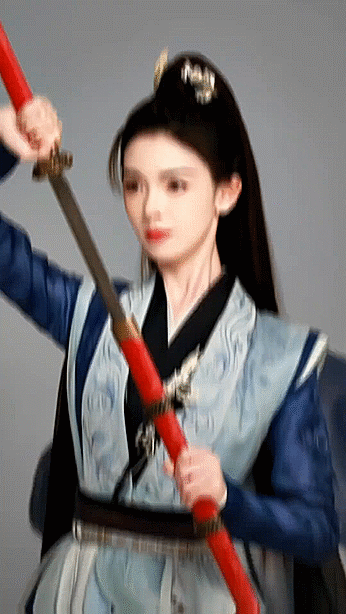
Cdrama: Fox Spirit Matchmaker: Red-Moon Pact (2024)
One look from the fox demon girl group is enough. | 狐妖小红娘月红篇 | iQIYI
Watch this video on Youtube: https://www.youtube.com/shorts/aJ_IoNxiw78
#Fox Spirit Matchmaker: Red-Moon Pact#涂山小红娘月红篇#Fox Spirit Matchmaker 1#Fox Spirit Matchmaker: Yue Hong#Tu Shan Xiao Hong Niang Yue Hong Pian#Tu Shan Xiao Hong Niang#Hu Yao Xiao Hong Niang#狐妖小红娘•月红篇#狐妖小红娘#狐妖小紅娘月紅篇#2024#CCTV#iQiyi#youtube#cdrama#chinese drama#behind the scenes#shorts#short video#poster#Yang Mi#Tushan Hong Hong#Cristy Guo#Tushan Ya Ya#Hu Lian Xin#Tushan Rong Rong#Wen Zheng Rong#Shi Ji#Black Fox#Zhu Xu Dan
1 note
·
View note
Text







Jiang Qilin as Dan Tuo & Guo Qilin as Shen Xing in 边水往事 | Escape from the Trilateral Slopes (2024) episode 21
#bonus:


#escape from the trilateral slopes#cdramaedit#cdramasource#asiandramanet#cdrama#chinese drama#边水往事#dramasource#dailyasiandramas#asiancentral#jiang qilin#guo qilin#userkunedits#mlmsource#cinemapix#crimeshowsource#filmtvtoday#filmtvcentral#userthing#tvedit#dailyflicks#fyeahtv#tvarchive#cinematv#userbbelcher#chewieblog#mancandykings#whump#whumpedit#asian whump
29 notes
·
View notes
Note
a o e i i er ai ei ao ou an en ang eng ong i ia iao ie iu ian in iang ing iong u ua uo uai ui uan un uang ueng ü üe üan ün a o e er ai ao ou an en ang eng yi ya yao ye you yan yin yang ying yong wu wa wo wai wei wan wen wang weng yu yue yuan yun b ba bo bai bei bao ban ben bang beng bi biao bie bian bin bing bu p pa po pai pei pao pou pan pen pang peng pi piao pie pian pin ping pu m ma mo me mai mei mao mou man men mang meng mi miao mie miu mian min ming mu f fa fo fei fou fan fen fang feng fu d da de dai dei dao dou dan den dang deng dong di diao die diu dian ding du duo dui duan dun t ta te tai tei tao tou tan tang teng tong ti tiao tie tian ting tu tuo tui tuan tun n na ne nai nei nao nou nan nen nang neng nong ni niao nie niu nian nin niang ning nu nuo nuan nü nüe l la le lai lei lao lou lan lang leng long li lia liao lie liu lian lin liang ling lu luo luan lun lü lüe g ga ge gai gei gao gou gan gen gang geng gong gu gua guo guai gui guan gun guang k ka ke kai kei kao kou kan ken kang keng kong ku kua kuo kuai kui kuan kun kuang h ha he hai hei hao hou han hen hang heng hong hu hua huo huai hui huan hun huang z za ze zi zai zei zao zou zan zen zang zeng zong zu zuo zui zuan zun c ca ce ci cai cao cou can cen cang ceng cong cu cuo cui cuan cun s sa se si sai sao sou san sen sang seng song su suo sui suan sun zh zha zhe zhi zhai zhei zhao zhou zhan zhen zhang zheng zhong zhu zhua zhuo zhuai zhui zhuan zhun zhuang ch cha che chi chai chao chou chan chen chang cheng chong chu chua chuo chuai chui chuan chun chuang sh sha she shi shai shei shao shou shan shen shang sheng shu shua shuo shuai shui shuan shun shuang r re ri rao rou ran ren rang reng rong ru rua ruo rui ruan run j ji jia jiao jie jiu jian jin jiang jing jiong ju jue juan jun q qi qia qiao qie qiu qian qin qiang qing qiong qu que quan qun x xi xia xiao xie xiu xian xin xiang xing xiong xu xue xuan xun
NAKU 🫵
49 notes
·
View notes
Note
Ji ji fu ji ji
a o e i i er ai ei ao ou an en ang eng ong i ia iao ie iu ian in iang ing iong u ua uo uai ui uan un uang ueng ü üe üan ün a o e er ai ao ou an en ang eng yi ya yao ye you yan yin yang ying yong wu wa wo wai wei wan wen wang weng yu yue yuan yun b ba bo bai bei bao ban ben bang beng bi biao bie bian bin bing bu p pa po pai pei pao pou pan pen pang peng pi piao pie pian pin ping pu m ma mo me mai mei mao mou man men mang meng mi miao mie miu mian min ming mu f fa fo fei fou fan fen fang feng fu d da de dai dei dao dou dan den dang deng dong di diao die diu dian ding du duo dui duan dun t ta te tai tei tao tou tan tang teng tong ti tiao tie tian ting tu tuo tui tuan tun n na ne nai nei nao nou nan nen nang neng nong ni niao nie niu nian nin niang ning nu nuo nuan nü nüe l la le lai lei lao lou lan lang leng long li lia liao lie liu lian lin liang ling lu luo luan lun lü lüe g ga ge gai gei gao gou gan gen gang geng gong gu gua guo guai gui guan gun guang k ka ke kai kei kao kou kan ken kang keng kong ku kua kuo kuai kui kuan kun kuang h ha he hai hei hao hou han hen hang heng hong hu hua huo huai hui huan hun huang z za ze zi zai zei zao zou zan zen zang zeng zong zu zuo zui zuan zun c ca ce ci cai cao cou can cen cang ceng cong cu cuo cui cuan cun s sa se si sai sao sou san sen sang seng song su suo sui suan sun zh zha zhe zhi zhai zhei zhao zhou zhan zhen zhang zheng zhong zhu zhua zhuo zhuai zhui zhuan zhun zhuang ch cha che chi chai chao chou chan chen chang cheng chong chu chua chuo chuai chui chuan chun chuang sh sha she shi shai shei shao shou shan shen shang sheng shu shua shuo shuai shui shuan shun shuang r re ri rao rou ran ren rang reng rong ru rua ruo rui ruan run j ji jia jiao jie jiu jian jin jiang jing jiong ju jue juan jun q qi qia qiao qie qiu qian qin qiang qing qiong qu que quan qun x xi xia xiao xie xiu xian xin xiang xing xiong xu xue xuan xun
13 notes
·
View notes